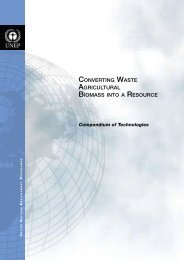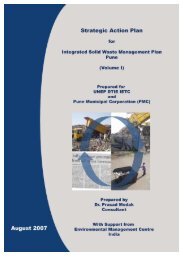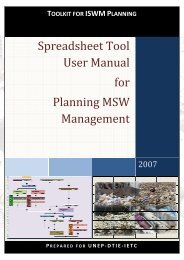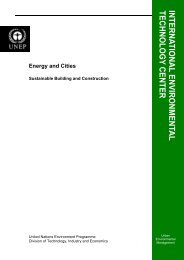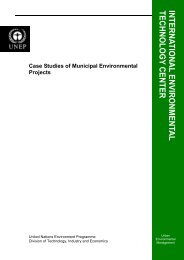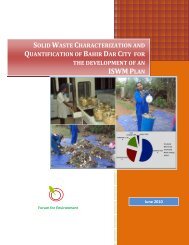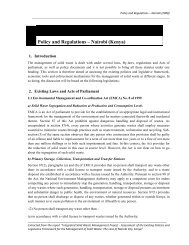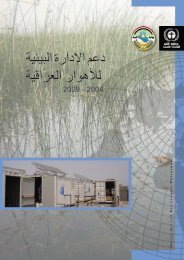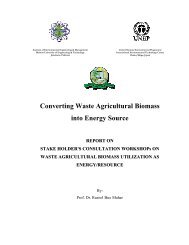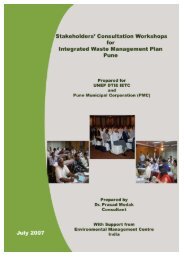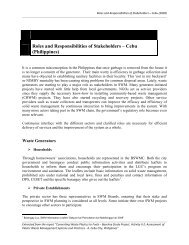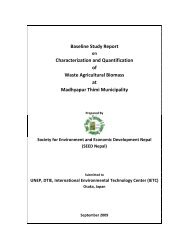Closing an Open Dumpsite and Shifting - International ...
Closing an Open Dumpsite and Shifting - International ...
Closing an Open Dumpsite and Shifting - International ...
You also want an ePaper? Increase the reach of your titles
YUMPU automatically turns print PDFs into web optimized ePapers that Google loves.
PREFACE<br />
M<strong>an</strong>aging solid waste is one of the most daunting tasks for local governments worldwide. It<br />
is complicated by the failure to properly m<strong>an</strong>age the continuing increase in waste generation,<br />
on one h<strong>an</strong>d, <strong>an</strong>d the decreasing availability of space for waste disposal, on the other. Failure<br />
to properly m<strong>an</strong>age solid waste not only affects political careers, but also devalues l<strong>an</strong>d <strong>an</strong>d,<br />
most import<strong>an</strong>tly, contributes to communicable diseases. In spite of its crudeness <strong>an</strong>d the<br />
health hazards, open dumping in pits, vac<strong>an</strong>t l<strong>an</strong>ds, or water bodies has become a prevalent<br />
practice in developing countries because it is initially less expensive <strong>an</strong>d easier th<strong>an</strong> adopting<br />
<strong>an</strong> environmentally sound waste disposal system. Much progress has been attained in<br />
reducing the volume of waste that go to the disposal facilities through waste reduction,<br />
recovery, recycling <strong>an</strong>d other programmes, but the residual wastes invariably end up in <strong>an</strong><br />
open dumpsite.<br />
Notwithst<strong>an</strong>ding the constraints confronting local authorities, for the sake of hum<strong>an</strong> health<br />
<strong>an</strong>d welfare, natural resources, especially l<strong>an</strong>d <strong>an</strong>d freshwater, open dumpsites should not be<br />
allowed as a public facility. It is a matter of national policy that dumpsites be closed because<br />
of the adverse effects on society <strong>an</strong>d the environment. It is incumbent upon both national <strong>an</strong>d<br />
local authorities to adopt better <strong>an</strong>d environmentally sound waste disposal methods by<br />
shifting from their current policy <strong>an</strong>d practice of open dumping to controlled dumping <strong>an</strong>d<br />
tr<strong>an</strong>sition to s<strong>an</strong>itary l<strong>an</strong>dfilling. The sooner governments, especially at the local level, make<br />
<strong>an</strong>d implement this decision, the sooner their towns <strong>an</strong>d cities will enjoy sound waste<br />
m<strong>an</strong>agement <strong>an</strong>d disposal, <strong>an</strong>d the less the risks will be to the health <strong>an</strong>d lives of their<br />
communities.<br />
A policy shift from open dumping to s<strong>an</strong>itary l<strong>an</strong>dfilling has implications on local<br />
preparedness to operate <strong>an</strong>d m<strong>an</strong>age a l<strong>an</strong>dfill as well as how the current dumpsites will be<br />
ab<strong>an</strong>doned. Consequently, there is a need to build <strong>an</strong>d enh<strong>an</strong>ce the technical <strong>an</strong>d m<strong>an</strong>agement<br />
capacities of local authorities. In recognition of this need <strong>an</strong>d as part of the United Nations<br />
Environmental Programme’s (UNEP) global effort to promote environmentally sound<br />
technologies, the <strong>International</strong> Environmental Technology Centre (IETC), develops training<br />
programmes for capacity building. This publication is a Training Module on Solid Waste<br />
M<strong>an</strong>agement designed especially for local authorities <strong>an</strong>d their staff.<br />
This Training Module has two parts, which are complementary:<br />
(1) How To Decommission or Close <strong>an</strong> <strong>Open</strong> <strong>Dumpsite</strong> in <strong>an</strong> Environmentally Sound<br />
M<strong>an</strong>ner, Including Rehabilitation <strong>an</strong>d Redevelopment<br />
(2) How To Shift from <strong>Open</strong> Dumping to Controlled Dumping <strong>an</strong>d Eventually into S<strong>an</strong>itary<br />
L<strong>an</strong>dfilling.<br />
The two parts have been combined into one training package since they refer to consequential<br />
activities that should not be treated independent of each other; m<strong>an</strong>y of the basic principles<br />
carry forward from one method to the next.<br />
The Training Module is intended to provide local authorities with the basic knowledge <strong>an</strong>d<br />
underst<strong>an</strong>ding of the skills required to close dumpsites <strong>an</strong>d shift to controlled dumping <strong>an</strong>d to<br />
s<strong>an</strong>itary l<strong>an</strong>dfilling so that they c<strong>an</strong> make good policy <strong>an</strong>alyses <strong>an</strong>d informed decisions. Local<br />
chief executives, city or municipal pl<strong>an</strong>ning officers, solid waste m<strong>an</strong>agers, l<strong>an</strong>dfill engineers<br />
<strong>an</strong>d other decision makers involved in solid waste m<strong>an</strong>agement will find the fundamental<br />
activities, procedures <strong>an</strong>d recommendations necessary to make this tr<strong>an</strong>sition <strong>an</strong>d address<br />
their local situation.<br />
iii



